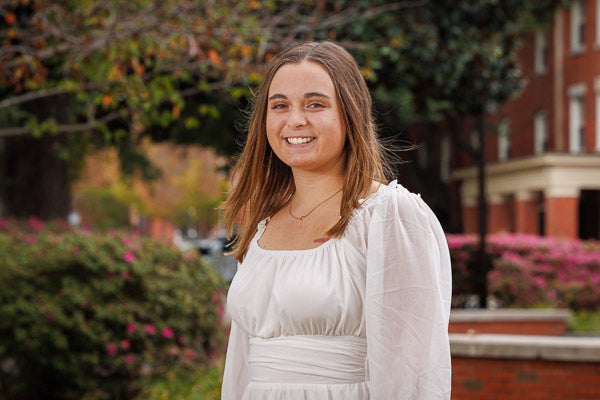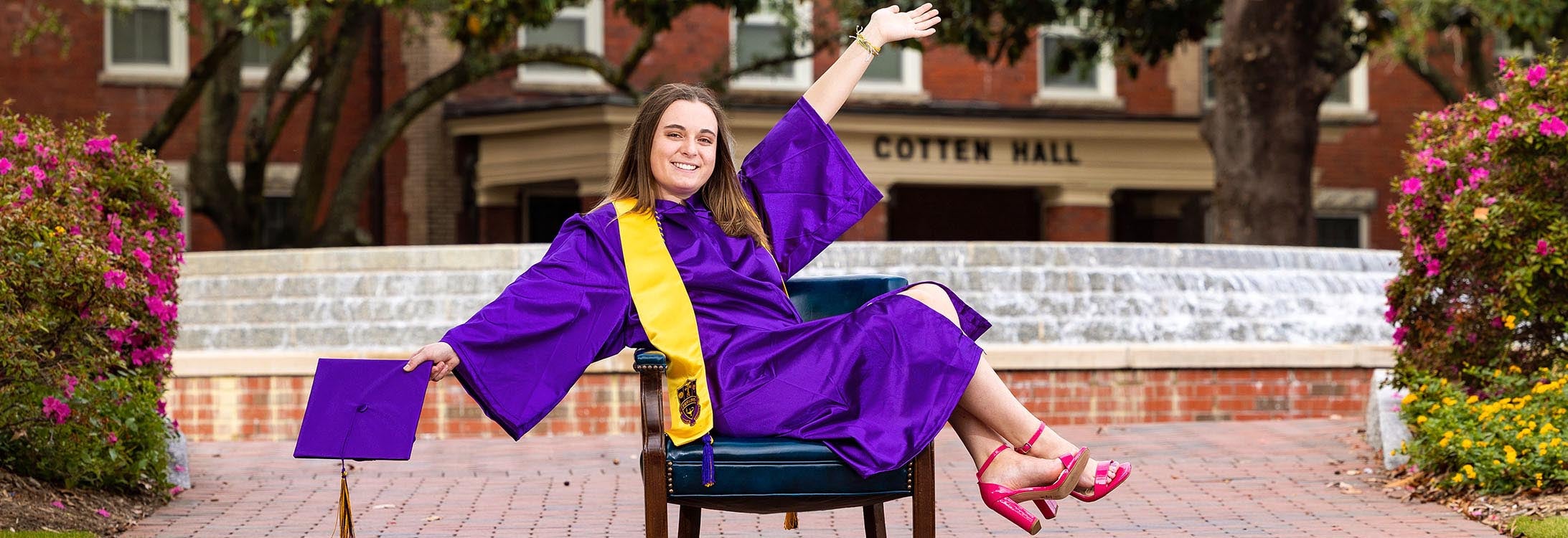PIRATE SURVIVOR
Nursing grad’s resilience leads to remission, cap and gown
STATISTICS
Name: Abby Coderre
College: College of Nursing
Major: Nursing
Age: 22
Classification/Year: Senior
Hometown: Wilmington, North Carolina
Hobbies/interests: Going to Pure Barre to workout, watching movies, and painting
Clubs and Organizations: Newman Center; orientation assistant; Future Pirate Nurse Living Learning Community
FAVORITES
Favorite hangout: The beach
Favorite place on campus: Health Sciences Student Center
Favorite place to eat: Basil’s
Favorite class: Nursing Care of Clients with Alterations in Mental Health
Professor who influenced you the most: Dr. Joy Shepard – my pediatric clinical instructor
MOTIVATIONS
Dream job: Pediatric oncology nurse
Your words to live by: “God’s not done with you.”
What advice do you have for other students? Live in the moment, never take any opportunity or experience for granted because you never know if it will be your last.
Best life lesson learned at ECU? Participate in all the trips and events that the student rec center offers. Even if you aren’t an athletic person, there are still activities like paddleboarding at the north rec complex or tubing down the Tar River that are free to students.
Stories with happy endings are always the most fun to tell.
In the fall of 2018, Abby Coderre arrived at East Carolina University from her home in Wilmington, ready to take on the world and graduate as a Pirate nurse. She had begun to feel the freedom of being a student at a big college: football games, meeting new people and “getting to do whatever you want.”
She spent the summer before her sophomore year as an orientation assistant, a job she loved because she got to sell potential Pirates on the value of the education at ECU.
“I grew to love ECU and I wanted to share that with incoming freshmen. That summer was the first summer before I got diagnosed. My freshman year was pretty much my only year on main campus.”
In the summer of 2019, though, the carefree life of a college student turned a frightening corner.
Coderre’s older sister, Alexis, was a senior when Abby started at ECU and nudged Abby to get seen for chest pains that wouldn’t resolve.
“I give it all to my sister. I don’t know that I’d be here if it wasn’t for her forcing me to go to the ER,” Coderre said.

Nursing graduate Abby Coderre battled cancer during her time at ECU and will now work as a pediatric nurse at ECU Health Medical Center where she received part of her treatment. (Photo by Cliff Hollis)
June 16, 2019. An emergency room doctor told her she had cancer. The results of a biopsy were inconclusive as to the variety. Surgery was scheduled for two weeks later. Eight hours into a four-hour procedure, doctors were able to remove a tumor that had “attached to every organ” in her body.
“The doctor had a hard time getting it out,” Coderre said. After five days in the hospital recuperating she finally had a definitive diagnosis — acute lymphoblastic lymphoma. The Leukemia Foundation calls Coderre’s diagnosis, a cancer of immune cells, rare and aggressive.
The doctors told her treatment would take two and a half years. Her first question was if she could stay in school.
After her diagnosis, she switched to online learning, part-time, finishing the rest of the credits necessary to apply to the College of Nursing for one of the competitive slots for what would be her junior year. She was about a semester ahead of schedule, having some college credit before beginning her freshman year, which allowed her to ease into part-time learning. Fewer classes helped lighten the load during the first frenetic months of surgeries and chemotherapy.
“I still lived on campus as a mentor in the nursing living learning community, which was nice because I could stay on taking my classes online” Coderre said. “My number one priority was having as much normalcy in my life as I could. I fought to stay on campus because you aren’t allowed to stay on campus if you are part time. I was able to stay with my peers instead of driving home for my treatment which is exhausting if you live two and a half hours away.”
She endured extreme fatigue, neuropathy in her hands and, of course, hair loss. Walking up a stair was exhausting, let alone climbing College Hill to her room from classes and meals. At points the chemo would last 24 hours. Jaw pain, which is common with the treatment, set in. Lumbar punctures were necessary, which caused debilitating headaches.
Just as she was settling into a new normal of hospital visits and online learning, the COVID-19 pandemic took hold of campus and threw an even larger monkey wrench into Coderre’s life.
The weekly chemo lasted until the pandemic started, and then treatments went to once a month. Nursing school started shortly thereafter, and she rang the bell at the hospital celebrating remission and the end of her treatments on Nov. 10, 2021.
Never stopped
The schoolwork never stopped, though. Coderre was going to graduate.
“I learned to bring my schoolwork with me and do it while I was receiving chemo. The nurses would put signs on the door if I had to take a test. I took one of my finals while I was sitting in the ER waiting for transport from one hospital to another,” Coderre said, with a hint of a laugh at the absurdity of the situation.
“Other than that, I’m back to being a normal college student, I guess,” Coderre joked.
Coderre said that she doesn’t know how she would have gotten through the past three years without her “amazing” family. Her parents had been separated for several years when she got the diagnosis, but cancer helped her family focus on caring for one another and seeing her through treatment.
“Seeing me was the most important thing, and not having me split my time between them,” Coderre said. “They came together and my dad moved in and slept on the couch for the first few months so that he could be near me. It was nice to have the help when I needed it.”
Alexis moved to California with her Marine husband before Coderre began her sophomore year, which she said was challenging because Alexis “had always been by my side.”
Coderre did her clinical rotations for nursing school on the pediatric ward where she has spent so many days and nights fighting to rid the illness from her body. Her oncologist tried to get her a job in his clinic for after graduation, but Coderre is adamant that she wants to help make treatment for other kids less scary.
Joy Shepard, a recently retired ECU College of Nursing faculty member who currently works at ECU Health medical facilities in Washington and Plymouth, recalls Coderre as having a “courageous spirit” for her willingness to do clinical rotations with very sick children while being treated for cancer herself.
“Everyone on the floor was excited to see her,” Shepard said. “Nurses who knew her from her time as a patient took her under their wing.”
Amy Hines, a charge nurse for the palliative care unit at ECU Health Medical Center in Greenville, and one of Coderre’s preceptors, said that Coderre is a very compassionate person who will thrive in the pediatric setting.
“Abby cared for one of our adult patients who said ‘you just don’t understand’ about repeated needle sticks. I reminded him that Abby did understand and he completely changed after that,” Hines said. “She has been on the other side, so she understands the fears and discomfort and that is going to make her a fantastic nurse.”
Amazing resilience
To complete nursing school healthy is a feat, Hines said, so for her to finish school while undergoing cancer treatment is phenomenal.
Abby Paul, an academic advisor at the College of Nursing, said that many adults, let alone college students, don’t show the same level of resiliency that seems to come naturally to Coderre.
“She couldn’t take full load of classes but was willing to do whatever she could in the face of what she was going through to keep moving forward. A lot of people would wilt in the face something like that and let it control everything about them, but she kind of pushed back and said, ‘this is not going to control everything about me.’”
Paul remembers a time that Coderre’s propensity for not making her illness center stage benefited a family staying at the Ronald McDonald House, where Coderre worked during the time she was in school.
“She met a family at the Ronald McDonald House, who had little children who were facing something challenging,” Paul said. “She wanted to see if we could give service hours or donate gift cards or something so the kids could have a nice Christmas while they were at Ronald McDonald House.”
After taking the national nursing examinations, she has a job waiting for her at the James and Connie Maynard Children’s Hospital at ECU Health Medical Center, where she had received some of her treatments.
“They’ve been amazing. The nurses helped me with my homework and cheered me on and now that I’m at the end and I’m going to work at the same hospital I was treated at — not many people can say that,” Coderre said.
Shepard said that Coderre’s experiences as a cancer patient put her in a unique position to empathize with kids under her care after graduation.
“She’s walked down that road. It’s one thing to treat patients, and another to have lived on the other side of the bed rail. The courage you need to muster to do that is incredible,” Shepard said.
With graduation in reach, she’s ready to make a difference in the lives of children and young adults.
“I’m honored that I’ve been able to make it through the nursing program and handle it mentally because this program is so challenging. I can’t wait to be the nurse that I had so many times,” Coderre said.
And what about crossing the stage for graduation?
“Surreal. I hope I don’t trip with the shoes that I have picked out,” Coderre joked. “I don’t think it’s going to hit me until I actually start working. Some might see graduation as just a certificate, but it’s so much more. I really look forward to using the degree that I’ve been in the process of getting for more than four years.”
